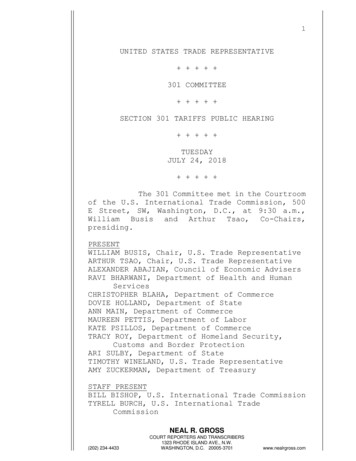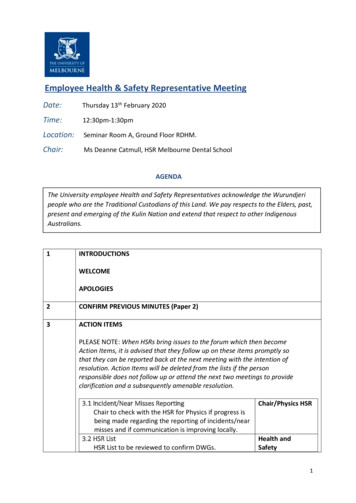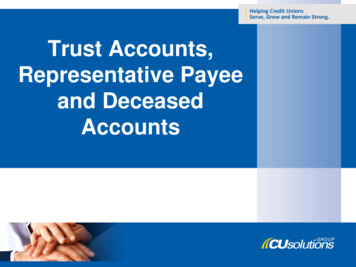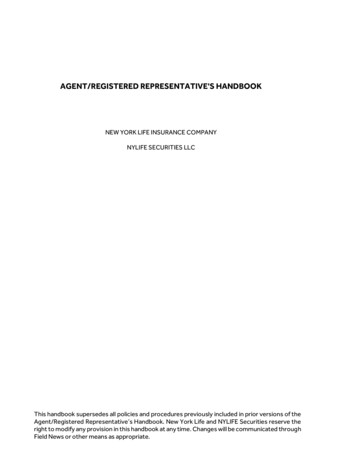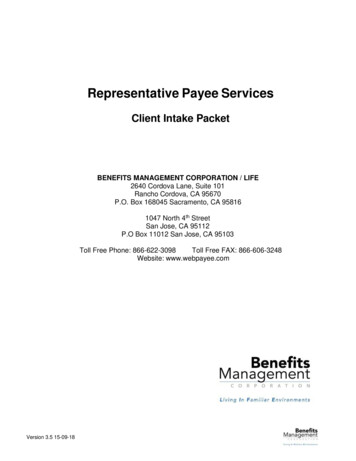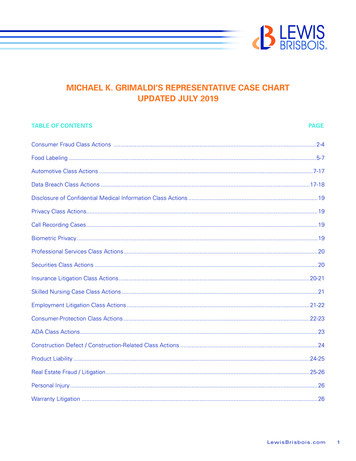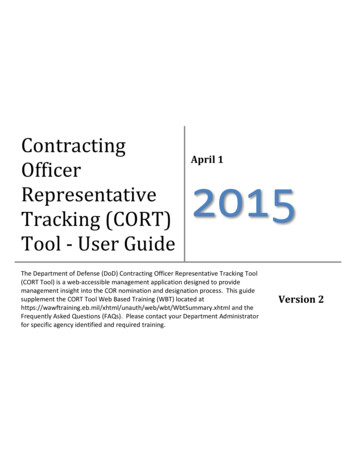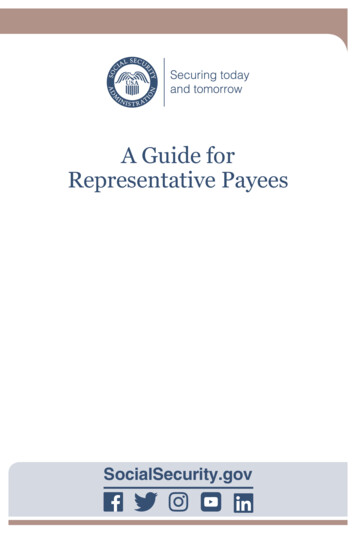
Transcription
A Guide forRepresentative PayeesSocialSecurity.gov
What’s insideIntroduction1Helping you manage your new responsibility1How you must use monthly benefits3How to handle a large payment ofpast-due benefits3How to hold funds6Changes to report10Medicare and Medicaid12Contacting Social Security14
IntroductionMore than eight million people, who get monthly SocialSecurity or Supplemental Security Income (SSI) benefits,need help managing their money.In these cases, we can appoint a relative, friend, orother interested party to serve as the “representativepayee.” We thoroughly investigate those who apply to berepresentative payees to protect the interests of SocialSecurity beneficiaries, because a representative payeereceives the beneficiary’s payments and is given theauthority to use them on the beneficiary’s behalf.If you agree to serve as a representative payee, you’vetaken on an important responsibility that can make apositive difference in the beneficiary’s life.With certain exceptions, a payee may not collect a feefor services provided to the beneficiary. You can’t collecta fee for services from the beneficiary, unless SocialSecurity allows it, or you’re the legal guardian authorizedby a court to charge a guardian fee.This booklet provides basic information on how to be arepresentative payee and isn’t intended to answer allquestions. For specific information about your situation,you should talk with a Social Security representative atyour local Social Security office.Helping you manage your new responsibilityAs a representative payee, you must know what thebeneficiary’s needs are so you can decide the best useof benefits for their care and well-being. This is especiallyimportant if the beneficiary doesn’t live with you.Each year, Social Security will ask you to complete a formto account for the benefits you’ve received. You can eitherfill out the form and return it to Social Security or go onlineat www.socialsecurity.gov/myaccount/rep-payee.html1
to file the report. You can use the worksheet on pages16-17 to keep track of what you spend. You may alsobe contacted by a Protection and Advocacy agency inyour state to review your receipts and records of incomeand expenses.As a representative payee, you’ll also need to tell SocialSecurity about changes that may affect the beneficiary’seligibility. A list of these changes is on page 10.Remember, the law requires representative payees to usethe benefits properly. If a payee misuses benefits, theymust repay the misused funds. A payee who’s convictedof misusing funds may be fined and imprisoned.NOTE: We appoint a representative payee to manageSocial Security and SSI funds only. A payee has nolegal authority to manage non-Social Security incomeor medical matters. A representative payee, however,may need to help a beneficiary get medical servicesor treatment.Family members often use a power of attorney asanother way to handle a family member’s finances. ForSocial Security purposes, a power of attorney isn’t anacceptable way to manage a person’s monthly benefits.Social Security recognizes only the use of a designatedrepresentative payee for handling the beneficiary’s funds.A special note about children who getSupplemental Security Income (SSI) paymentsIf you’re a payee for a child receiving SSI payments, youmust seek treatment for the child’s medical conditionwhen it’s necessary. If you don’t get medical treatmentfor the child, Social Security may appoint a newrepresentative payee.2
How you must use monthly benefitsFirst, you must take care of the beneficiary’s day-today needs for food and shelter. Then, you must use themoney for the beneficiary’s medical and dental care that’snot covered by health insurance. You can also pay forthe beneficiary’s personal needs, such as clothing andrecreation. You must save any money left after you payfor the beneficiary’s needs, preferably in U.S. SavingsBonds or an interest-paying bank account, insured undereither federal or state law.If the beneficiary is in a nursing home or institution, usetheir benefits to pay the fees. In this case, you shouldset aside a minimum of 30 each month to use for thebeneficiary’s personal needs.If the beneficiary is in an institution and gets Medicaid,or is a member of a family on Temporary Assistance forNeedy Families (TANF), contact Social Security aboutusing benefits for the family.You may not take a fee from the beneficiary for yourservices as a representative payee. If you have questionsabout this, contact your local Social Security office.How to handle a large payment ofpast-due benefitsIn certain instances, Social Security will pay past-duebenefits all at once in a lump sum, which may be alarge amount. First, you must spend the money on thebeneficiary’s current needs such as rent and a securitydeposit, food, or furnishings. After paying these expenses,you may spend the money to improve the beneficiary’sdaily living conditions or for better medical care. Spendthe money wisely. You should use the money in thebeneficiary’s best interests. Then, if there’s money left3
over, you must save it, preferably in U.S. Savings Bondsor an interest-paying bank account, insured under eitherfederal or state law.Improve daily living conditionsAfter you’ve provided for the beneficiary’s basic needs, youmay spend the money to improve the beneficiary’s dailyliving conditions or for better medical care.You may decide to use the beneficiary’s funds formajor health-related expenses, if they’re not coveredby the beneficiary’s health insurance. Examples ofthese expenses are reconstructive dental care, amotorized wheelchair, rehabilitation expenses, orinsurance premiums.You could use the money to arrange for the beneficiary togo to school or get special training.You may also spend some of the money for thebeneficiary’s recreation, such as movies, concerts, ormagazine subscriptions.Special purchasesYou may want to make some of the following specialpurchases for the beneficiary. A home — Use funds for a down payment. Usethe money for payments on a house owned bythe beneficiary. Home improvements — Pay for repairs and changesto make the beneficiary’s home safer and moreaccessible; for example, install a ramp or widendoorways for wheelchair access. Furniture — Buy furniture for the beneficiary’s personaluse. You can buy items such as a television thebeneficiary can share with others in the household.4
A car — Use funds for a down payment. Use themoney for monthly car payments as long as the car isused for and owned by the beneficiary.If you’re not sure if it’s okay to use money for a specific item(for example, paying a bill owed before you became payee),contact Social Security before you spend the money.A special note about SSI beneficiariesTo continue receiving SSI, a beneficiary must not haveresources worth more than 2,000 ( 3,000 for couples).We don’t count all resources; however, some items youbuy could cause the beneficiary to lose their SSI benefits.Any money you don’t spend could also count as aresource. Check with us before making major purchasesfor an SSI beneficiary.A special note about blind or disabled childrenreceiving SSISometimes, blind or disabled children will receive large,past-due SSI payments covering more than six monthsof benefits. Usually, these payments must go directly intoa separate banking account. We call this a “dedicatedaccount” because funds in this account are only forcertain expenses related to the child’s disability. Thechild’s dedicated account must be separate from otheraccounts. Except for certain past-due payments, no otherfunds may be put into the account. We don’t count moneyin the dedicated account as a resource, and we don’tcount interest earned on the money as income or as aresource. You can only use money in a dedicated accountfor the following expenses: Medical treatment and education or job skills training. Personal needs related to the child’s disability — suchas therapy and rehabilitation, special equipment, andhousing modifications.5
Necessary items or services related to the child’sdisability, such as legal fees for the child’s benefit claim.You should get approval from us before spending moneyon the items listed above.You must keep a record of all money taken from thisaccount. Save the receipts for all items or services boughtbecause we’ll review these records at least once a year.If you knowingly use money from the dedicated accountfor anything other than the expenses listed above, youmust repay us from your own funds. If you have questionsabout dedicated accounts, contact us.How to hold fundsThe Treasury Department requires all federal benefitpayments to be made using a form of electronic payment.We recommend that you hold benefits in a checking orsavings account to protect against loss or theft. Also, don’tmix the beneficiary’s funds with your own or other funds.You must save any money left over after meeting thebeneficiary’s day-to-day and personal needs. Thepreferred ways of saving is U.S. Savings Bonds oran interest-paying bank account that’s insured undereither federal or state law. Interest earned belongs tothe beneficiary.The checking or savings account title must show thebeneficiary’s ownership of the funds and show you as thefinancial agent. Neither you as the payee, nor anotherthird party, can have any ownership of the account. Thebeneficiary must never have direct access to the account.Any account title (under state law) that shows beneficiaryownership of the account with you as the financial agent isacceptable. Don’t use joint accounts. We recommend thatyou title the account in one of the following ways:6
(Beneficiary’s name) by (your name),representative payee. (Your name), representative payee for(beneficiary’s name).Your bank will provide help if you have more questions.An exception for parents and spouses who arerepresentative payeesA common checking account for all family members livingin the same household who receive benefits may show aparent or spouse as the owner of the account. Children’ssavings, however, must be in separate savings accountsfor each child, showing the child as the account owner.Organizations that serve as payeesSometimes nursing homes or other organizations placefunds for several beneficiaries in a single checking orsavings account known as a “collective account.” Thisis usually acceptable, but special rules apply to theseaccounts: Account titles must show the funds belong to thebeneficiaries and not the representative payee. The account must be separate from the organization’soperating account. Any interest earned belongs to the beneficiaries. There must be proper procedures to documentcredits and debits with clear, current records of eachbeneficiary’s share. The organization must make the account andsupporting records available to us when we askfor them. The organization must obtain approval from SocialSecurity before establishing the account.7
Some examples of collective account titles are: “Sunnydale Nursing Home for Social Securitybeneficiaries.” “Sunnydale Nursing Home Resident Trust Account.”If you have any questions about collective accounts,contact us.You’ll need approval from us first, if your organizationserves as payee and wants to charge a beneficiary for thecost of past care. We also need to approve any decisionto “pool” the funds of several beneficiaries for an itemsuch as a television that will benefit the group.More information about being a payee is available inthe Guide for Organizational Representative Payeesavailable at www.socialsecurity.gov/payee or from anylocal Social Security office. You can also order a copy bycalling 1-800-772-1213 (TTY 1-800-325-0778).Keeping recordsAs a representative payee, you’re responsible forkeeping records and reporting on how you spendthe benefits by completing a RepresentativePayee Report (Form SSA-623, SSA-6230, orSSA-6233). We’ll mail the proper form to youonce a year. You can also file the report online You must complete the report unless you are exempt.The following types of payees are exempt from the annualaccounting requirements: A natural or adoptive parent of a minor child whoprimarily resides in the same household as thebeneficiary. A legal guardian of a minor child who primarily residesin the same household as the beneficiary.8
A natural or adoptive parent of a disabled individualwho primarily resides in the same household as thebeneficiary. The spouse of an individual.You may choose to use the worksheet on pages 16-17to help you keep track of the money you spend. When youneed to fill out the Representative Payee Report, you canadd the amounts in each column of your worksheet andput the totals on the accounting form. If you need extraworksheets, call 1-800-772-1213 (TTY 1-800-325-0778).To supplement Social Security’s annual accountingprocess, we may select you for an onsite review.Protection and Advocacy agencies in each state thatreceive annual grants from Social Security may contactyou to schedule a review to ensure satisfactory oversightof funds and performance of payee duties.Paying income taxSome people who get Social Security benefits have topay federal income tax on them. At the beginning of eachyear, Social Security mails each beneficiary a SocialSecurity Benefit Statement (Form SSA-1099) that showsthe total benefits they received during the previous year.Give this statement to the beneficiary’s tax preparer todetermine if any taxes are due on the benefits.A special note about SSI beneficiaries in amedical facilityIf Medicaid pays more than half the cost for an SSIbeneficiary in a medical facility, we limit SSI paymentsto 30 a month, plus any extra money the state pays.We also apply this limit to children under age 18, ifprivate health insurance — or both private insurance andMedicaid — pay more than half the cost of their care ina medical facility. You must use the entire payment for9
the beneficiary’s personal needs. After meeting all thebeneficiary’s needs, you must save any money left overon their behalf.Changes to reportYou need to tell Social Security about any changesthat may affect benefit payments. As payee, you’reresponsible for repaying money you receive for thebeneficiary if any of the events listed below occur and youdon’t report them. You must tell us if: The beneficiary moves. The beneficiary starts or stops working, no matter howlittle the earnings amount. A disabled beneficiary’s medical condition improves. The beneficiary starts receiving another governmentbenefit or the benefit amount changes. The beneficiary travels outside the United States for 30days or more. The beneficiary is imprisoned for a crime that carries asentence of more than one month. The beneficiary is committed to an institution bycourt order for a crime committed because of amental impairment. Custody of a child beneficiary changes or a childis adopted. The beneficiary is a stepchild, and the parents divorce. The beneficiary gets married. The beneficiary no longer needs a payee. The beneficiary dies.You must also tell us if: You’re no longer responsible for the beneficiary. You move.10
You no longer wish to be payee. You’re convicted of a felony. You’re violating a condition of your probation or paroleimposed under federal or state law.You must tell us if you or the beneficiary have anoutstanding arrest warrant for a felony in the state whereyou or the beneficiary live. In states that don’t classifycrimes as felonies, you must also tell us if you or thebeneficiary have an outstanding warrant for a crimepunishable by death or imprisonment for more thanone year.A special note about reporting changes forSSI beneficiariesIf the beneficiary gets SSI benefits, you must also reportthe following changes: The beneficiary moves to or from a hospital, nursinghome, correctional facility or other institution. A married beneficiary separates from their spouse, orthey begin living together again after a separation. Someone moves into or out of the beneficiary’shousehold. The beneficiary or their spouse has a change inincome or resources.A child’s SSI benefit amount may change if there are anychanges in the family’s income or resources.If you fail to report any actions to Social Security, we maypay the beneficiary too much money. In that case, youmay have to return the money the beneficiary wasn’t dueand the payments may stop. If you intentionally withholdinformation to continue to receive payments, you mayface criminal prosecution. Criminal penalties can includefines and imprisonment.11
Also, payees for people on SSI should remember thelimits for savings and resources are 2,000 for singlesand 3,000 for couples. All interest earned on savingscounts toward that limit. Money in a child’s dedicatedsavings account (see page 5) doesn’t count towardthe resource limit. For more information, read What YouNeed to Know When You Get Supplemental SecurityIncome (SSI) (Publication No. 05-11011).If you stop being a payeeIf you’ll no longer be the payee, you must notify SocialSecurity immediately. This is important, because we’llhave to select a new payee as soon as possible. Whenyou’re no longer responsible for the beneficiary, you mustreturn any benefits, including interest and any cash youhave, to Social Security. We’ll reissue the funds to thebeneficiary or the new payee.If the beneficiary diesIf the beneficiary dies, you must give any saved benefitsbelonging to their estate to the legal representative ofthe estate, or the savings must be managed according tostate law. If you need information about state law, contactthe probate court or an attorney.When a person who receives Social Security benefitsdies, no check is payable for the month of death, even ifthey die on the last day of the month. You must return anycheck received for the month the beneficiary died. An SSIcheck, however, is payable the month of death. But youmust return any SSI checks that come after the monthof death.Medicare and MedicaidPayees may need to help beneficiaries get medicalservices or treatment. This is a requirement for the payeesof children receiving SSI. You should keep a record of12
medical services and medical expenses not covered byMedicare and Medicaid. For information about Medicarecoverage, read Medicare (Publication No. 05-10043).If the beneficiary has low income and few resources,the state may pay Medicare premiums and someout-of-pocket medical expenses. A person may qualifyeven if their income or resources are too high for SSI. Forinformation, contact the state or local medical assistance(Medicaid) agency or social services office.The beneficiary may also be able to get Extra Helppaying for the annual deductibles, monthly premiums,and prescription co-payments related to the Medicareprescription drug program (Part D). The beneficiary mayqualify for Extra Help if they have limited income andresources. These income and resource limits usuallychange each year.Beneficiaries will automatically get Extra Help and don’thave to apply if: They have both Medicaid with prescription drugcoverage and Medicare. They have Medicare and Supplemental SecurityIncome. The state pays for their Medicare premiums.For more information about getting Extra Help withMedicare prescription drug plan costs, call SocialSecurity’s toll-free number, or visit our website. You canalso help the beneficiary apply for Extra Help online atSocial Security’s website.13
Contacting Social SecurityThere are several ways to contact us, such as online,by phone, and in person. We’re here to answer yourquestions and to serve you. For more than 80 years,Social Security has helped secure today and tomorrow byproviding benefits and financial protection for millions ofpeople throughout their life’s journey.Visit our websiteThe most convenient way to conduct SocialSecurity business from anywhere is onli
a separate banking account. We call this a “dedicated account” because funds in this account are only for certain expenses related to the child’s disability. The child’s dedicated account must be separate from other accounts. Except for certain past-due payments, no other funds may be put into the account. We don’t count money
